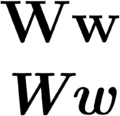Definify.com
Webster 1913 Edition
W
W
Webster 1828 Edition
W
W
is the twenty third letter of the English Alphabet. It takes its written form and its name from the union of two Vs, this being the form of the Roman capital letter which we call U. The name, double u, being given to it from its form or composition, and not from its sound, especially the vowels. W is properly a vowel, a simple sound, formed by opening the mouth with a close circular configuration of the lips. it is precisely the ou of the French, and the u of the Spaniards, Italians and Germans. With the oter vowels it forms diphthongs, which are of easy pronunciation; as in well, want, will, dwell; pronouced ooell, ooant, ooill, dooell. In English, it is always followed by another vowel, except when followed by h, as is when; but this case is an exception only in writing, and not in pronunciation, for h precedes w in utterance; when being pronounced hooen. In Welsh, w, which is sounded as in English is used without another vowel, as in fwl, a fool; dwn, dun; dwb, mortar; gwn, a gun, and a gown.W
, at the end of words is often silent after a and o, as in law, saw, low,Definition 2026
W
W
 | ||||||
| ||||||
|---|---|---|---|---|---|---|
Translingual
Letter
W upper case (lower case w)
- The twenty-third letter of the basic modern Latin alphabet.
See also
- (Latin script): Aa Bb Cc Dd Ee Ff Gg Hh Ii Jj Kk Ll Mm Nn Oo Pp Qq Rr Sſs Tt Uu Vv Ww Xx Yy Zz
- (Variations of letter W): Ẃẃ Ẁẁ Ŵŵ Ẅẅ Ẇẇ Ẉẉ W̊ẘ Ⱳⱳ ᴡ Ww
- (Letter combinations): Ꜳꜳ Ææ ᴁᴭ Ǽǽ Ǣǣ Ꜵꜵ Åå Ꜷꜷ Ꜹꜹ Ꜻꜻ Ꜽꜽ ct ȸ DZDzdz DŽDždž ᴂᵆ ᴔ & ff fi ffi fl ffl ℔ IJij LJLjlj Ỻỻ Ŋŋ NJNjnj Œœ ɶ Ꝏꝏ Ȣȣᴕ ȹ ẞß ſtst ᵫ Ůů Ww Ꝡꝡ
Symbol
W
- (chemistry) Symbol for tungsten.
- (metrology) Symbol for watt.
- (biochemistry) IUPAC 1-letter abbreviation for tryptophan
- (physics) work
See also
Other representations of W:
|
- Letter styles
-

Capital and lowercase versions of W, in normal and italic type
-

Uppercase and lowercase W in Fraktur
English
Abbreviation
W
- Wednesday
- (sports) The number of wins by a team or player
- (cricket) wickets
- (neologism) Nickname for George W. Bush
- west
Derived terms
- (sports): OTW
See also
Letter
W (upper case, lower case w, plural Ws or W's)
See also
- (Latin script letters) letter; Aa, Bb, Cc, Dd, Ee, Ff, Gg, Hh, Ii, Jj, Kk, Ll, Mm, Nn, Oo, Pp, Qq, Rr, Ss, Tt, Uu, Vv, Ww, Xx, Yy, Zz
Danish
Pronunciation
- IPA(key): /dɔbəlveː/, [ˈd̥ʌb̥əlˌveːˀ]
Letter
W (lowercase w)
- the twenty-third letter of the Danish alphabet
See also
- (Latin script letters) bogstav; Aa, Bb, Cc, Dd, Ee, Ff, Gg, Hh, Ii, Jj, Kk, Ll, Mm, Nn, Oo, Pp, Qq, Rr, Ss, Tt, Uu, Vv, Ww, Xx, Yy, Zz, Ææ, Øø, Åå
Dutch
Pronunciation
- (letter name): IPA(key): /ʋeː/
Letter
W (capital, lowercase w)
- The twenty-third letter of the Dutch alphabet.
Abbreviation
W
See also
Finnish
Letter
W (upper case, lower case w)
- The letter of the Finnish alphabet, called kaksoisvee and written in the Latin script.
Usage notes
- In the Finnish alphabet, W is a variant of V.
- Used only in loanwords and proper names with old spelling (compare Wirtanen).
See also
- (Latin script letters) letter; Aa, Bb, Cc, Dd, Ee, Ff, Gg, Hh, Ii, Jj, Kk, Ll, Mm, Nn, Oo, Pp, Qq, Rr, Ss, Šš, Tt, Uu, Vv, Ww, Xx, Yy, Zz, Žž, Åå, Ää, Öö
German
Pronunciation
- IPA(key): /veː/
- Homophone: weh
Letter
W (upper case, lower case w)
- The twenty-third letter of the German alphabet.
Abbreviation
W
German Sign Language
Etymology
Related to the French Sign Language sign for "W".
Production
This one-handed GSL sign is produced as follows:
- Posture the dominant hand in the “W” shape.
Letter

- the letter W
Ido
Pronunciation
- IPA(key): /w/
Letter
W (lower case w)
See also
- (Latin script letters) litero; Aa, Bb, Cc, Dd, Ee, Ff, Gg, Hh, Ii, Jj, Kk, Ll, Mm, Nn, Oo, Pp, Qq, Rr, Ss, Tt, Uu, Vv, Ww, Xx, Yy, Zz
Italian
Pronunciation
- (name of letter) IPA(key): /vudˈdoppjo/, /ˈdoppjovu/
- (name of letter, for brevity in common acronyms) IPA(key): /vu/
- Homophones: V, vu
- (phonetic realization) IPA(key): [v], [w] (varies depending on the source language of the loanword)
Letter
W m, f (invariable, lower case w)
- The twenty-third letter of the Latin alphabet, called doppia vu or vu doppia in Italian.
Usage notes
- The letter W is not considered part of the Italian alphabet. It is found mainly in loanwords.
Symbol
W
Antonyms
- M (down with)
See also
- (Latin script letters) lettera; Aa, Bb, Cc, Dd, Ee, Ff, Gg, Hh, Ii, (Jj), (Kk), Ll, Mm, Nn, Oo, Pp, Qq, Rr, Ss, Tt, Uu, Vv, (Ww), (Xx), (Yy), Zz
-
 Italian alphabet on Wikipedia.Wikipedia
Italian alphabet on Wikipedia.Wikipedia
Malay
Pronunciation
Letter
W
See also
- (Latin script letters) Aa, Bb, Cc, Dd, Ee, Ff, Gg, Hh, Ii, Jj, Kk, Ll, Mm, Nn, Oo, Pp, Qq, Rr, Ss, Tt, Uu, Vv, Ww, Xx, Yy, Zz
Portuguese
Letter
W (upper case, lower case w)
See also
- (Latin script letters) letra; Aa, Bb, Cc, Dd, Ee, Ff, Gg, Hh, Ii, Jj, Kk, Ll, Mm, Nn, Oo, Pp, Qq, Rr, Ss, Tt, Uu, Vv, Ww, Xx, Yy, Zz
Saanich
Pronunciation
- IPA(key): /w/
Letter
W
See also
- (Latin script letters) A, Á, Ⱥ, B, C, Ć, Ȼ, D, E, H, I, Í, J, K, Ꝁ/K̵/₭, Ḵ, Ḱ, L, Ƚ, M, N, Ṉ, O, P, Q, S, Ś, T, Ⱦ, Ṯ, Ŧ, U, W, W̲, X, X̲, Y, Z, s
Somali
Pronunciation
Letter
W upper case (lower case w)
Usage notes
- The twentieth letter of the Somali alphabet, which follows Arabic abjad order. It is preceded by N and followed by H.
See also
- (Latin script letters) ', Bb, Tt, Jj, Xx, Khkh, Dd, Rr, Ss, Shsh, Dhdh, Cc, Gg, Ff, Qq, Kk, Ll, Mm, Nn, Ww, Hh, Yy, Aa, Ee, Ii, Oo, Uu
w
w
 | ||||||
| ||||||
|---|---|---|---|---|---|---|
Translingual
Alternative forms
- vv (obsolete)
Letter
w lower case (upper case W)
- The twenty-third letter of the basic modern Latin alphabet.
- The first letter of callsigns allocated to American broadcast television and radio stations east of the Mississippi river.
Pronunciation
Symbol
w
See also
- (Latin script): Aa Bb Cc Dd Ee Ff Gg Hh Ii Jj Kk Ll Mm Nn Oo Pp Qq Rr Sſs Tt Uu Vv Ww Xx Yy Zz
- (Variations of letter W): Ẃẃ Ẁẁ Ŵŵ Ẅẅ Ẇẇ Ẉẉ W̊ẘ Ⱳⱳ ᴡ Ww
- (Letter combinations): Ꜳꜳ Ææ ᴁᴭ Ǽǽ Ǣǣ Ꜵꜵ Åå Ꜷꜷ Ꜹꜹ Ꜻꜻ Ꜽꜽ ct ȸ DZDzdz DŽDždž ᴂᵆ ᴔ & ff fi ffi fl ffl ℔ IJij LJLjlj Ỻỻ Ŋŋ NJNjnj Œœ ɶ Ꝏꝏ Ȣȣᴕ ȹ ẞß ſtst ᵫ Ůů Ww Ꝡꝡ
- Turned: ʍ
- Ƿ
- ʬ
Other representations of W:
|
- Letter styles
-

Capital and lowercase versions of W, in normal and italic type
-

Uppercase and lowercase W in Fraktur
English
Letter
w (lower case, upper case W, plural w's)
See also
- (Latin script letters) letter; Aa, Bb, Cc, Dd, Ee, Ff, Gg, Hh, Ii, Jj, Kk, Ll, Mm, Nn, Oo, Pp, Qq, Rr, Ss, Tt, Uu, Vv, Ww, Xx, Yy, Zz
Noun
w
Adjective
w
Danish
Pronunciation
- IPA(key): /dɔbəlveː/, [ˈd̥ʌb̥əlˌveːˀ]
Letter
w (uppercase W)
- the twenty-third letter of the Danish alphabet
See also
- (Latin script letters) bogstav; Aa, Bb, Cc, Dd, Ee, Ff, Gg, Hh, Ii, Jj, Kk, Ll, Mm, Nn, Oo, Pp, Qq, Rr, Ss, Tt, Uu, Vv, Ww, Xx, Yy, Zz, Ææ, Øø, Åå
Dutch
Pronunciation
- Rhymes: -eː
- (letter name): IPA(key): /ʋeː/
Letter
w (lower case, upper case W)
- The twenty-third letter of the Dutch alphabet.
See also
Ido
Pronunciation
- IPA(key): /w/
Letter
w (upper case W)
See also
- (Latin script letters) litero; Aa, Bb, Cc, Dd, Ee, Ff, Gg, Hh, Ii, Jj, Kk, Ll, Mm, Nn, Oo, Pp, Qq, Rr, Ss, Tt, Uu, Vv, Ww, Xx, Yy, Zz
Japanese
Etymology 1
Short for 笑う (warau, “to laugh”).
Interjection
w
- (Internet slang) LOL; an expression of amusement or laughter.
- このバカwwwwwww
- Kono baka wwwwwww
- This idiot LOL
- このバカwwwwwww
Usage notes
w is most often found used multiple times in a row as in the example above.
See also
- テラワロス (てらわろす, terawarosu)
- (笑) (かっこわら, kakko wara)
- ワロス (warosu)
- ワロタ (warota)
- 草 (kusa)
Etymology 2
Near homophone of ダブル (daburu, “double”).
Symbol
w (katakana ダブリュー, romaji daburyū)
- Symbol for ダブル (daburu, “double-u”)
Lower Sorbian
Etymology
From Proto-Slavic *vъ(n), from Proto-Indo-European *én
Alternative forms
- we (especially before labial consonants and consonant clusters)
Pronunciation
- IPA(key): /w/ (before vowels)
- (silent before consonants)
Preposition
w (with locative)
Malay
Letter
w (lower case, upper case W)
See also
- (Latin script letters) Aa, Bb, Cc, Dd, Ee, Ff, Gg, Hh, Ii, Jj, Kk, Ll, Mm, Nn, Oo, Pp, Qq, Rr, Ss, Tt, Uu, Vv, Ww, Xx, Yy, Zz
Norwegian
Pronunciation
- (letter name): IPA(key): /ˈdɔbəlt.ˌʋeː/
- (phoneme): IPA(key): /ʋ/, /v/
Letter
w
- The 23rd letter of the Norwegian alphabet.
Usage notes
- Only appears in loanwords from e.g. German.
Polish
Etymology
From Proto-Slavic *vъ(n), from Proto-Indo-European *én.
Pronunciation
- IPA(key): /f/
Preposition
w
Usage notes
Some combinations of sounds, mostly consonant clusters at the beginning of the following noun, require that this preposition is used in longer form we. Examples:
- we włosach (in the hair)
- we Wrocławiu (in Wrocław)
But:
- w Warszawie (in Warsaw)
Portuguese
Pronunciation
Letter
w (lower case, upper case W)
See also
- (Latin script letters) letra; Aa, Bb, Cc, Dd, Ee, Ff, Gg, Hh, Ii, Jj, Kk, Ll, Mm, Nn, Oo, Pp, Qq, Rr, Ss, Tt, Uu, Vv, Ww, Xx, Yy, Zz
Spanish
Pronunciation
- (phoneme) IPA(key): /w/, /gu/, /β/
- (letter name) IPA(key): /ˈuβe ˈdoβle/, /ˈdoβle be/
Letter
w (lower case, upper case W)
- The 24th letter of the Spanish alphabet.
Swedish
Pronunciation
- Letter name
- IPA(key): /ˈdɵbɛlveː/
- Phoneme
- IPA(key): /v/
Letter
w (lower case, upper case W)
- The twenty-third letter of the Swedish alphabet, called dubbel-ve and written in the Latin script. Previously treated as a variant of the letter v and not as its own independent letter.
Usage notes
- In blackletter typography, 'w' was commonly used instead of 'v'. When printers (gradually during the 19th century) changed to Latin typography, spelling changed from 'w' to 'v', except in some family names. However, this change does not count as a spelling reform.
- In many abbreviations, Swedes say 'v' (veh, as in German) instead of 'w' (dubbelveh), e.g. BMW (beh em veh), VW (veh veh), WC (veh seh), WHO (veh haw oh), WWW (veh veh veh).
Turkmen
Pronunciation
- (phoneme) IPA(key): /β/
Letter
w (upper case W)
See also
- (Latin script letters) harp; Aa, Bb, Çç, Dd, Ee, Ää, Ff, Gg, Hh, Ii, Jj, Žž, Kk, Ll, Mm, Nn, Ňň, Oo, Öö, Pp, Rr, Ss, Şş, Tt, Uu, Üü, Ww, Yy, Ýý, Zz,
Welsh
Alternative forms
- (in negative statements; also in affirmative statements in North Wales): dw
- (in affirmative statements): rw
Pronunciation
- IPA(key): [u]
Verb
w
- (colloquial, South Wales) first-person singular present of bod (in affirmative or negative statements)
- W i yn y car. ― I’m in the car.
- W i ddim yn hapus. ― I’m not happy.
Related terms
- ydw (interrogative)

